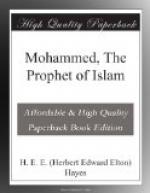The facts concerning his entry into Medinah are obscure and uncertain, but there is no doubt that his advent was hailed with delight by the “helpers” and “refugees.” Hospitality was freely offered, and, owing to the prophet’s independent spirit, reluctantly accepted. One of his earliest actions after arrival was to consolidate his forces by strengthening the brotherhood, making the obligations of his followers to one another, and himself, more binding than the ties of blood.
IV.—GROWTH AND PROGRESS.
He now found himself the acknowledged head of a large growing community, which looked to him for guidance in all its affairs—religious, social, and political. Proudly, and with true Eastern despotism, he took upon himself the dignities of prophet, priest, and king. He needed no one with whom to share these functions. His was the sole right—his alone. His ambitions were being realised. The striving of years, the disappointment, doubts, and fears that had so tormented him were well repaid, and could be forgotten in the glamour that now surrounded him. Enthusiastic and fanatical votaries crowded around him with loyal acclamation. Pampered and petted with excessive adulation, can it be wondered that he had visions of power hitherto undreamed of? His scheme of national reform paled into insignificance in the light of possibility. He saw himself the leader of a world-wide conquest—the promoter of a prodigious scheme of universal reform. He was not merely the messenger of the Arab people, but the mouthpiece of God to the whole wide world. And by the Divine Power that possessed him would receive the humble homage of proud and mighty nations, whose haughty monarchs would bow in lowly submission to his imperious will! Prophetic insight, regal authority, judicial administration were his by divine right, to be enforced, if needs be, at the point of the Islamic sword.
As his position improved, so his ideals deteriorated. His early piety was modified by the lust of worldly power. In place of patient pacific methods of propagation, he adopted a cruel, ruthless, warlike policy, and it was not long—perhaps owing to the extreme poverty which afflicted the new community—before the would-be prophet became the leader of a robber host. Yet even in spite of the glamour that surrounded him, and the questionable behaviour that characterised this period of his life, we catch occasional glimpses of that which reveals the working of nobler instincts in his mind. Had his environment been other than it was, Mohammed had been indeed a hero in the world’s history. Ignorance of truth led him to place himself under the mysterious power of hallucination. The lonely brooding of the cave had produced that which had urged him into a position of bondage. He was the slave of a false idea, which so possessed him that he pressed onward, in spite of all that stood in his way, whether it was good or bad. It exerted an irresistible influence over all his impulses, leading him into actions in every way indefensible. When fair means failed, he adopted foul, and so succeeded beyond his highest dreams.




